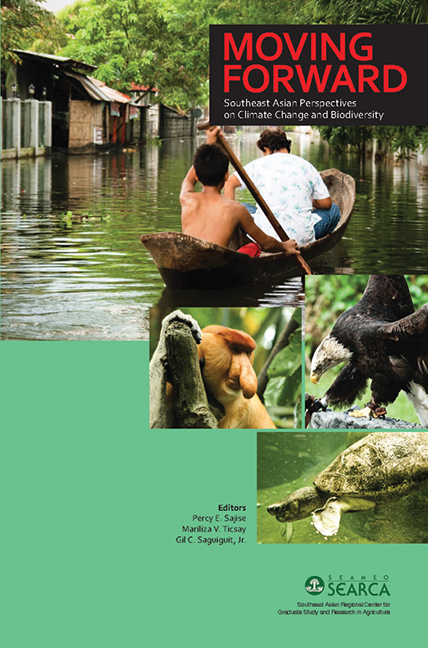Book contents
- Frontmatter
- Contents
- Tables
- Figures
- Foreword
- Preface
- Contributors
- Acronyms
- INTRODUCTION
- REGIONAL PERSPECTIVES AND CROSS-CUTTING ISSUES
- COUNTRY PERSPECTIVES
- 5 Animal Genetic Resource Conservation and Climate Change in Cambodia: Reducing Livestock to Decrease GHG Emission?
- 6 Malaysia's Current Policy and Research Initiatives Toward Climate Change: Impacts to Biodiversity
- 7 Anticipated Impacts of Climate Change on Marine Biodiversity: Using Field Situations that Simulate Climate Change in Singapore
- 8 Climate Change and Biodiversity in the Philippines: Potential Impacts and Adaptation Strategies
- 9 Research Initiatives on Climate Change Impacts and Adaptation in Thailand
- 10 The Role of Biodiversity in Climate Change Mitigation in Vietnam: The Red River Estuary - Ba Lat Case Study
- 11 Implications of the Dutch-Philippines Biodiversity Research on the Impacts, Vulnerability, and Adaptation to Climate Change: The Coastal Ecosystem
- CHALLENGES AND FUTURE ACTIONS
- Index
9 - Research Initiatives on Climate Change Impacts and Adaptation in Thailand
from COUNTRY PERSPECTIVES
Published online by Cambridge University Press: 21 October 2015
- Frontmatter
- Contents
- Tables
- Figures
- Foreword
- Preface
- Contributors
- Acronyms
- INTRODUCTION
- REGIONAL PERSPECTIVES AND CROSS-CUTTING ISSUES
- COUNTRY PERSPECTIVES
- 5 Animal Genetic Resource Conservation and Climate Change in Cambodia: Reducing Livestock to Decrease GHG Emission?
- 6 Malaysia's Current Policy and Research Initiatives Toward Climate Change: Impacts to Biodiversity
- 7 Anticipated Impacts of Climate Change on Marine Biodiversity: Using Field Situations that Simulate Climate Change in Singapore
- 8 Climate Change and Biodiversity in the Philippines: Potential Impacts and Adaptation Strategies
- 9 Research Initiatives on Climate Change Impacts and Adaptation in Thailand
- 10 The Role of Biodiversity in Climate Change Mitigation in Vietnam: The Red River Estuary - Ba Lat Case Study
- 11 Implications of the Dutch-Philippines Biodiversity Research on the Impacts, Vulnerability, and Adaptation to Climate Change: The Coastal Ecosystem
- CHALLENGES AND FUTURE ACTIONS
- Index
Summary
Recent reports of the IPCC (2007) reiterate that global climate change is real and has been affecting many parts of the planet and various weather components. Climate change varies in time and space. To assess the impacts of climate change at the regional or local level, such as in the Southeast Asia region, details and careful investigations on the regional-, or even local-scale climate change and variability is urgently needed. This is a requisite if climate change adaptation and mitigation measures at these levels are established.
Realising this necessity, the Thailand Research Fund (TRF) launched its Climate Change and Impacts Program in 2006. The methodology starts from a detailed evaluation of the climate change situation in Thailand. In this step, questions on the aspects of climate change that have been observed, the level of confidence on the data observed, and whether there is a need for other evidences were considered. Based on the analysis and synthesis of such knowledge, the methodology then proceeds to assess the impacts, the vulnerabilities resulting from such changes, the adaptive measures that are in place, the effectiveness of these measures, and any additional measures that should be adopted.
This chapter reviews the current knowledge status on climate change and the future plans on climate change research in Thailand. It is hoped that such approach and the data generated could serve as basis for research on climate change, including its impacts on biodiversity.
CLIMATE CHANGE TRENDS IN THAILAND
Temperature Trends
Records of temperature in Thailand have been carried out regularly by the Department of Meteorology and other agencies. The data available went as far back as the 1950s, which revealed various aspects of temperature changes. Records from over 50 monitoring stations showed that the maximum temperature had increased at an average of 0.56°C during the past 50 years (Limskul and Goes 2008). This temperature increase was consistent with the information reported by IPCC (2007) on global temperature increases during the same period.
- Type
- Chapter
- Information
- Moving ForwardSoutheast Asian Perspectives on Climate Change and Biodiversity, pp. 165 - 180Publisher: ISEAS–Yusof Ishak InstitutePrint publication year: 2010

